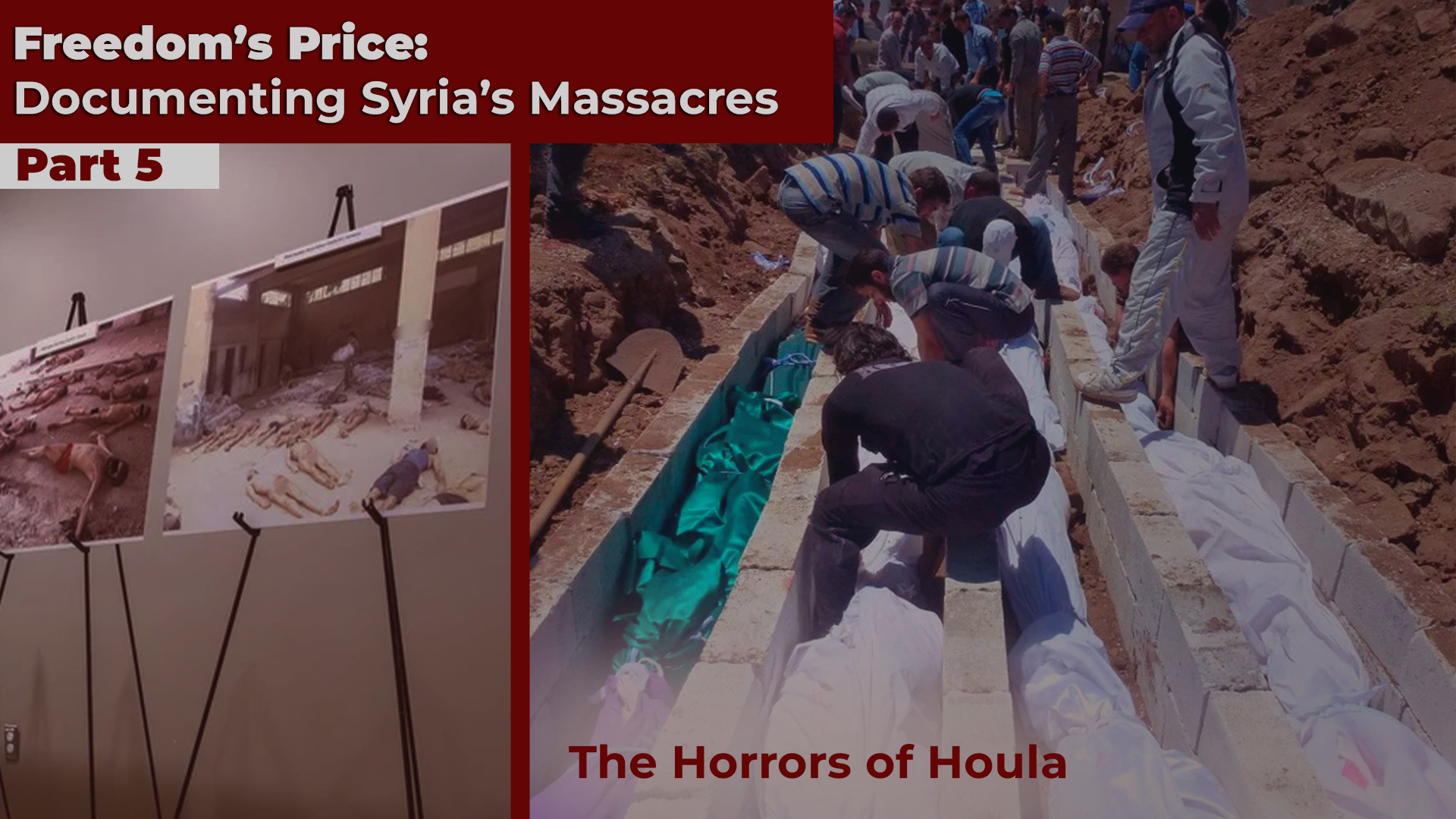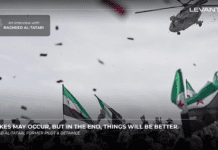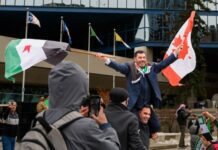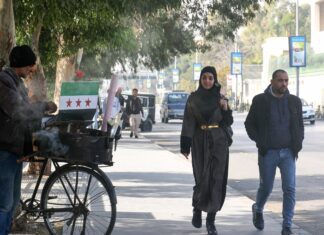The Horrors of Houla

Freedom’s Price is a series of articles aiming to shed light on the major massacres that have occurred during the ongoing conflict in Syria over the last 13 years. Each article highlights the crimes the Syrian people have endured in the course of their revolution and the high cost of their struggle for freedom and dignity. This installment in the series The Houla Massacres of May 25, 2012, where the Assad regime forces murdered over 100 civilians, including women and children, in the town of Houla, near Homs. Evidence reveals the massacre was carried out by Assad’s forces and pro-Assad militias, although the regime denied responsibility, blaming “terrorist groups.” The international community strongly condemned the massacre, leading to increased calls for intervention and further scrutiny of the Syrian conflict.
It was late afternoon on Friday, May 25 in Houla, instead of the normal anti-Assad protests held after the noon prayers, the village had been cowering under a relentless, nearly three hours long intense shelling from Assad regime tanks, rockets, and artillery. Finally, it seemed there was a lull in the assault, the fire slowed, yet unbeknownst to the residents the real terror was about to begin. As onlookers watched in helpless horror homes on the outskirts of the village were raided by men under the methodical cover fire from regime tanks. One of those was the home of Rasha al-Sayed.
The men who barged into her home beat her father in front of her and her sisters before shooting him, “I saw my father’s brains spill from his head,” she told the Guardian, “We took revenge for you, Imam Ali!” screamed one of the men, firing his gun into the ceiling. “They were security men and Shabiha,” recalled al-Sayed about that day – the Shabiha were the dreaded militias, mostly Alawite but all fanatically loyal to the Assad family – “What are we going to do with the children?”, one of them asked his companion, “Shoot them before the elders,” he coldly replied as one of the worst massacres of the war began on that now notorious day in May of 2012.
Levant 24 spoke with several witnesses to that terrible day as well as several media and human rights activists to honor the lives and memories of those lost that day and preserve a record in hopes that they, their families, and loved ones may find peace and closure in justice for the crimes against humanity that occurred that day.
On the 12th anniversary of this tragedy, the echoes of the cries of the victims demand attention, urging the world to confront the horrors of the past and renew a commitment to justice and accountability. Yet for those who experienced such events the march of time has done little to dull the memory. “By God, remembering the events of the massacre brings me back to that dreadful and astonishing day,” Dr. Osama Abdel Hadi, Ph.D. in Sharia law, and a revolutionary activist told L24, “It’s like the clock stopped ticking on that day.”
The Massacre
The Friday protests had become a routine part of the weekly rhythm of Houla, however, that day was different. While shelling from the regime checkpoints or the neighboring Alawite villages had been normal, they usually came after protests and were brief. The shelling began immediately after the prayers, before the protests began, and was so fierce that the men who had attended the prayers were trapped, unable even to return to their homes. This meant most of the women and children faced the barrage and coming onslaught alone.
Despite the sinister turn of events, Dr. Hadi said, “People felt secure,” in part due to the proximity of Free Syrian Army (FSA) revolutionary forces in the region, which is why, he continues, “people were taken aback by the arrival of pickup trucks, some occupants dressed in military attire according to eyewitnesses, and others disguised as civilians with masks.”

By all accounts the massacre unfolded methodically, with assailants moving from house to house, leaving a trail of death in their wake. “They entered each house, killed everyone inside, moved to the next, and continued until they targeted everyone in this small neighborhood,” Dr. Hadi recounts, his words echoing the unimaginable horror of that day.
Muhammad al-Homsi, another witness to the massacre, corroborates Dr. Hadi’s account while hinting at sectarian elements in the attack alleging that “the criminal elements of the regime, mostly from the Shia sect … began entering the civilians’ homes and killing everyone inside in cold blood, without any mercy.” Al-Homsi told L24 that those killed that day were mostly children, most of whom were slaughtered with knives. “The city of Houla was shocked by the terrifying news, causing great panic among the civilians. As a result, a large displacement occurred from the areas adjacent to regime-controlled areas to safer areas.” In the massacre’s aftermath, says al-Homsi, there was “a terrible panic and continuous fear of a repeat of the massacre.”

Levant 24 (L24) spoke with Aya Majzoub, Amnesty International’s Deputy Director for the Middle East and North Africa (MENA) Region. Majzoub reveals the brutality endured by the residents of Houla, “Some were killed during the shelling of the village by Syrian security forces using heavy artillery and tanks, but most were summarily executed in cold blood by men in military clothing, believed by the residents to be state-armed militias.”
According to eyewitness testimonies and interviews conducted by activist and human rights researchers, the grim pattern of systemic murder which has become all too common in areas overrun by regime forces became evident in the events of Houla. “Raids on the residential area of Teldo on the outskirts of Houla, killed 108 individuals, including 34 women and 49 children,” said Majzoub, “Sixty-two of those killed were from the Abd al-Razaq family in Teldo. All had been shot dead, except for a few children whose skulls had been smashed, presumably by rifle butts.”
Assad or Al-Qaeda?
Despite overwhelming evidence implicating the Assad regime, a false narrative pushed by Assad and his allies persists, attempting to shift blame onto extremist groups like Al-Qaeda and Jabhat al-Nusra. Majzoub refutes these claims, asserting that government forces and affiliated militias are responsible for the heinous crimes committed in Houla. “The UN Commission of Inquiry on Syria revealed in its August 2012 report that government forces and members of the Shabiha perpetrated outrageous and heinous crimes and concluded that they are responsible for the Houla massacre” she states unequivocally.

Stronger yet are the consistent choir of voices from Houla itself, survivors and eyewitnesses like al-Sayed, Dr. Hadi, and al-Homsi who emphasize that the perpetrators of the massacre were regime forces and affiliated individuals. “We, the sons of the city of Houla and witnesses to the massacre,” declares al-Homsi, “affirm that those who committed the massacre were elements of the regime forces.”
Demand for Accountability
Despite the international outcry that followed the massacre, justice remains elusive for the victims of Houla. “The international community bears a moral obligation to hold the Assad regime accountable for its heinous crimes,” asserts Majzoub. However, she emphasizes the urgent need for independent and effective accountability processes in Syria, lamenting, “Unfortunately, there is little hope in independent and effective accountability processes in Syria. While there have been some prosecutions and trials in other countries under the principle of universal jurisdiction, the vast majority of perpetrators of war crimes and crimes against humanity in Syria have yet to be held accountable.”
Dr. Hadi laments the lack of significant action to hold the perpetrators accountable. “The massacre of Houla shook all Syrians and the whole world,” he affirms, highlighting the global outrage and condemnation that followed. However, he adds, “significant action on the ground to hold the killer accountable was lacking.”
“The massacre of Houla shook all Syrians and the whole world with its indescribable scenes of horror,” affirms Al-Rahal, frustrated that even with the “international condemnation” and the expulsion of Assad regime diplomatic staff from 13 countries, it was all “without any significant action on the ground to hold the killers accountable, despite later confirmation by the United Nations investigative committees that Bashar al-Assad’s regime and his thugs were responsible for the massacre!”

In the aftermath of the Houla Massacres, efforts have been made to pursue accountability through various channels. International organizations, including the UN, have conducted investigations to uncover the truth behind the atrocities. However, progress has been hindered by political obstacles and the regime’s obstructionism.
As Majzoub explains, “Amnesty International has limited access to Syria, and no access to government-controlled parts of Syria given the security situation and the risks to Amnesty staff. Most of our research is conducted remotely via secure messaging apps. This makes our documentation work much more difficult, including in identifying survivors or witnesses of human rights violations and establishing the trust necessary to get people to open up to us. Further, some people are hesitant to speak out about human rights violations given the risk of reprisals.”
An End Assad’s Atrocities
Dr Hadi strongly cautions the international community against continued inaction regarding the Assad regime and its crimes, “Syrians have suffered for decades under this regime, enduring the horrors of killings, displacement, unlimited crimes, human slaughterhouses, massacres, and rapes. Now, the world has fallen short in stopping this criminal regime, and we see its crimes spreading globally, including the trafficking of Captagon, and drugs that have proliferated in Europe, the Gulf countries, and many other parts of the world. What is needed now is for all the honorable people in the world to come together to stop this regime, not only for the Syrians but for the sake of human safety. Humanity has not witnessed a regime as savage and brutal as this sectarian criminal regime.” As Dr. Hadi’s impassioned plea reverberates, it’s evident that the time for decisive action is now. With the Assad regime’s crimes extending far beyond Syrian borders, the global community stands at a critical juncture.








